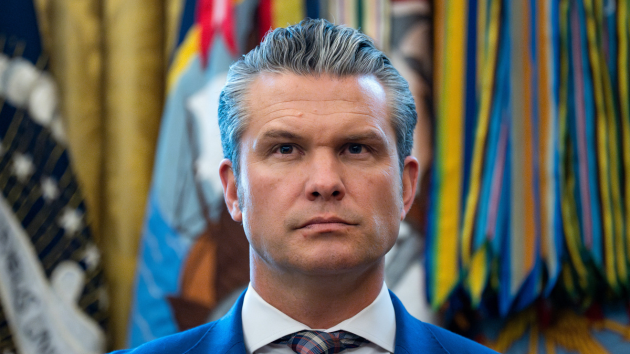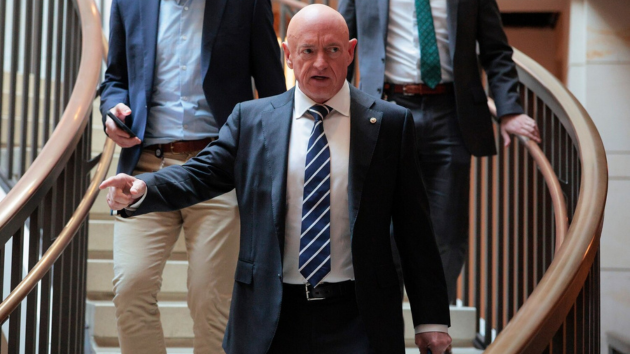Republicans want Trump to stick to economy, immigration. Down ballot, they’re fighting the culture wars
Written by ABC Audio ALL RIGHTS RESERVED on September 6, 2024
(WASHINGTON) — Republican calls are mounting for sharper focus by former President Donald Trump on inflation and immigration, worried that his penchant for personal attacks and scattered stances on social issues could serve as distractions in his quest to defeat Vice President Kamala Harris.
In key down-ballot races, however, Republicans are still fighting on the culture-war battlefields.
Red- and purple-state Republican Senate challengers are leaning on issues such as transgender rights and “wokeism” to define battle-hardened Democratic incumbents as too liberal and chip away at longstanding brands among their electorates.
The dynamic serves as a recognition that while Trump needs to win over swing voters in purple states, a Republican Senate majority hinges on GOP strongholds like Montana and Ohio, where boiling the race down to a conservative-versus-liberal matchup allows those states’ partisan bents to take over.
“If you’re running against a Democrat who’s running underneath Trump [on the ballot] in a state where Trump’s going to win overwhelmingly, then you have every reason to try to drive a shirts-and-skins election,” said GOP strategist Scott Jennings. “Get everybody into their corners, don’t let them think that ticket splitting is a good idea or something they should even consider.”
Republicans are bullish on their opportunities to unseat Montana Sen. Jon Tester and Ohio Sen. Sherrod Brown. They’re also hoping to expand a future majority by winning seats in purple states such as Arizona, Michigan, Nevada, Pennsylvania and Wisconsin — and they’re not just relying on kitchen-table issues to do it.
Senate Leadership Fund, the top GOP Senate super PAC, released ads in Montana, Ohio and Pennsylvania Tuesday knocking Democratic incumbents there for what they said was support for allowing “biological men” to compete in “women’s sports.”
Tim Sheehy, the Republican nominee to take on Tester, also knocked Democrats in his opening ad over “drag queen story time on our military bases” and said he was running “to get this woke crap out of our military.” At his speech at this summer’s Republican convention, Sheehy started his speech by saying, “My name is Tim Sheehy. Those are also my pronouns.”
And Bernie Moreno, the GOP nominee in Ohio, wrote on his website that he’s running in part to “end wokeness and cancel culture,” and a supportive super PAC had hammered one primary opponent as being untrustworthy for being a “champion for trans equality.”
The tactics are all part of a strategy to tear down in-state images of Democratic candidates — Tester and Brown in particular — as bipartisan dealmakers and instead remake them as nothing more than run-of-the-mill liberals in states where the overall partisan makeup makes such labels untenable. And if they’re successful Republican candidates, can just ride on Trump’s lengthy red-state coattails.
“It’s code for liberal,” one GOP strategist working on Senate races said of the recent ads. “It’s less about the actual trans issue itself and more about what their support for that issue actually says about their overall worldview.”
“Ohio and Montana are the inverse of almost every swing state Senate race of the last three cycles. And what I mean by that is, it’s not a question of, can Republicans reach beyond the Trump base to win over voters who didn’t support Trump? Neither Tim Sheehy nor Bernie Moreno needs a single voter to vote for them who isn’t already voting for Trump,” the person added.
Multiple Republican strategists boasted of poll numbers they’d seen of the popularity of GOP stances on transgender issues. A second operative working on Senate races said it was the “better testing and often the best testing message in surveys” they’d seen, and Brad Todd, another GOP strategist, said two campaign’s he’s working on are planning on releasing ads of their own on the topic.
And for Republican candidates like Sheehy, Moreno and Dave McCormick in Pennsylvania, all of whom can’t compete with the name recognition of their multi-term Democratic opponents, social issues offer an avenue to signaling alignment with voters looking to learn more about them.
“You do have to check some boxes with some voters so that they cross that threshold of, ‘Well, is this even someone that is culturally aligned with me enough to consider?’ And that issue right there for a lot of more culturally conservative voters is one that definitely pops,” Jennings said.
The moves mark a stark contrast with the conventional wisdom in the presidential race, where Republicans are pushing Trump to focus on the economy and border security and leave aside issues such as transgender athletes, gender-affirming care for minors and his scattershot stances on some women’s reproductive rights matters. Still, some references to culture-war issues could prove advantageous, according to Republican strategists.
“I do think [in the presidential race], voters look to it more as a wrong track/right track on the economy. They see the president as the person steering the ship of economic state and in charge of sovereignty,” Todd said. “I think because those issues are so closely tied to the president and Republicans have an advantage on both of them, that’s why you don’t see as much discussed there. But they would be fair game.”
To be certain, Republicans are not hinging their Senate prospects solely on red meat, telling ABC News that it’s just one piece of the puzzle and that burnishing their own credentials on kitchen table issues is also critical.
“The type of people could vote for Donald Trump and Jon Tester, Donald Trump and Sherrod Brown, we know those people exist. They’re going to start to say, ‘OK, I get it. Tester is Biden, Brown is Biden. So, what do you got for me? What’s my alternative? Give me something,'” said a third GOP strategist working on Senate races. “You just can’t be generic Republican versus a liberal, because that’s been tried, and that clearly doesn’t work against Tester and Brown.”
Still, the person added, “you got to have more than one arrow in your quiver, and that’s the cultural stuff. There’s a place for it in these races.”
Some Democrats swatted away concerns that Republicans’ messaging was as potent as they claimed.
“Does anyone base their vote on this issue? How many people has this actually happened to?” Democratic strategist and former Senate aide Jon Reinish asked of transgender rights issues. “I’m expecting it is slim to probably none.”
But other Democrats told ABC News that transgender rights and other culture war topics could be potent in red states and made sense as a strategy where simply keeping GOP voters in line could deliver Republican victories — and with them, likely the Senate majority.
“Those are just redder states where I think the culture war stuff just gets more traction and playing to your base can get you over 50%,” one Democratic pollster said. “So, it does not surprise me at all to take that tact in these redder states.”
Copyright © 2024, ABC Audio. All rights reserved.






